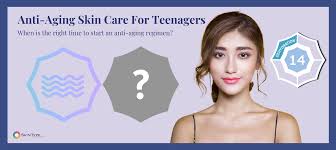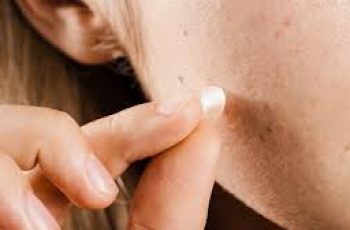
What Age to Start Using Antiaging Skin Care Products
The best age to start using antiaging skin care products and antiaging ingredients depends upon many things and differs from person to person. There is no perfect age to start using antiaging products.
What happens if you use antiaging products at a young age? It can help prevent aging if you are using the right products for your skin type.
This guide can help you decide when to start using antiaging skincare.
The age to begin antiaging skincare depends upon your Baumann Skin Type.
What age to start antiaging skincare products?
Unless you have a darker skin type and limited sun exposure, you should begin antiaging skin care products when you turn 30 years old. This does not mean you will have wrinkles when you are 30, but that it is time to prevent them.
If you have skin of color such as dark brown or black skin (Fitzpatrick skin types 4,5,and 6)and you do not get alot of sun, you should start antiaging skin care at age 35.
Anti-aging skin care for teenagers: when is the right time to start an anti-aging regimen?
Anti-aging skin care in your teens
If you 15 or 16 years old or older and you get a lit of sun exposure, you should begin some protective anti-aging products. For example, golfers, tennis players, swimmers, and others who do outdoor sports need to protect their skin from sun damage. Of course you need sunscreen, but there are other things you can do to protect your skin and prevent aging.
Should I start antiaging skin care products at 16?
16 years olds should begin some types of antiaging products if they have light skin and have a lot of sun exposure.
The best products to protect young skin from aging are sunscreen, antioxidants, Vitamin C and retinoids. If you choose to use a retinoid like retinol, use it at night and a SPF in the day.
Not all of those are right for every skin type, so make sure you shop by your Baumann Skin Type. Also only trust advice customized for your skin type and reviews from others with your same skin type.
Knowing if you need to start antiaging products is based on which Baumann Skin Type you have.
Take the Quiz
Can I start antiaging products at 18 years old?
First take our skin type quiz to see if you need to start antiaging products. It will ask you about your habits and age and if you test out as a wrinkle-prone type you will be able to choose from many different antiaging skincare brands that are right for your skin concerns.
When you are 18, you may already be on a retinoid like tretinoin or adapalene that has antiaging benefits. If so, that is one of the best ways to prevent skin aging because it blocks the causes of aging.
You should avoid using peels, glycolic creams, microneedling, dermarollers at your age. It is not necessary and it removes some protective layers from your skin that you need to help protect your skin.
If you want smooth, radiant, glass skin, choose an exfoliant but do not use it before going in the sun and always wear SPF.
What happens if you use anti-aging products while young? Will you become a baby? (no). Find out what actually happens to your skin with anti-aging products
What happens if you use antiaging products at a young age?
Starting aging skin care products at a young age can be a good or a bad idea depending upon which types of products you are using, your lifestyle habits, and your Baumann Skin Type.
Some antiaging creams and serums can have harmful effects if started when you are young. So- it is a good idea to begin antiaging products in your teens and 20s if you use the right ones.
Take the quiz to learn how to know which ones to safely use.
Anti-aging skin care products in your 20s
Surprisingly, 70% of 20 year olds who take our skin type quiz are a a wrinkle-prone skin type. This means that if you are in your 20s, you should begin anti-aging skin care.
You can find information about antiaging skin care routines in your 20s here.
Th best products to use depend on your skin type. Once you take the quiz we will help you find the best antiaging ingredients to use in your 20s. Here are some tips to protect your skin form getting wrinkles:
Hyaluronic acid serums don’t prevent aging
Vitamin C serums will prevent aging but may cause acne, sting skin, or irritate sensitive skin
SPF all day is the best aging prevention because your phone can age your skin
Retinol might be right for you but it depends on your Baumann Skin Type
What happens if you begin using antiaging products too young?
Are there harmful effects of antiaging creams in your teens, 20s and 30s?
Long term use of growth factors, stem cells, and exosomes has not been studied. These are not necessary for young skin and long term use might be harmful. For example, EGF has been associated with cancer.
Overuse of exfoliants like vitamin C and retinoids can cause skin problems and increase susceptibility to sun damage.
Peptides have no long term anti-aging effects so don’t waste your money on those- but they are not harmful. They feel good on the skin but so not prevent aging.
Hyaluronic acid hydrates skin but does not slow aging.
Oils with antioxidants are a great choice for antiaging skin care in young people unless you have oily skin.
Retinoids might be a good option for antiaging in your 20s and 30s if used correctly and in the right skin types.
Retinol structure
Should I use Anti-aging Skin care in my 30s?
Unless you have very dark skin which is protected by melanin, you should be using antiaging skin care in your 30s, even if you do not get a lot of sun exposure.
Which products to use depends on your skin type but most skin types need to begin a retinol or retinoid in their 30s.
Learn about antiaging routines for your 30s.
Genetics and Skin Aging
Genetics, lifestyle habits, diet, stress levels, consumption of fruits and vegetables, vitamin use, hormones, and sleep patterns all contribute to aging skin.
If you do not have a good diet and you eat a lot of sugar and you are in the sun a lot, you should begin anti-aging skin care sooner rather than later.
When to begin antiaging treatments?
You cannot control your genetics (at least not yet). This is why you need to identify if your skin is at risk for aging and get started on the best products for your Baumann Skin Type as soon as possible to prevent skin aging.
Your Fitzpatrick Skin Type (skin color) also affects how soon your skin ages because darker skin types have more protection from UV light and blue light. You have some control over epigenetics, hormones, stress levels, and medications. You have complete control over calorie consumption, exercise, sun exposure, sleep, diet and supplements. How much each of these plays a role in your skin health should be considered when trying to decide when to begin antiaging products.
How to slow aging?
Our skin type quiz asks you about the factors that are under your control such as habits and diet and assesses your risk for skin aging. The quiz will tell you if you need antiaging products at your age.
In most cases, you should begin an antiaging skincare routine at age 20, but if you have healthy lifestyle habits or darker skin you may be able to wait till you ae 30.
If you have significant sun exposure, a history of tanning bed use, red hair, poor diet, and/or lots of stress- you should begin an antiaging skincare routine in your teens. Teenagers that play outdoor sports should be started on antiaging skincare to protect their skin.
Take the Quiz
Your habits effect how fast your skin ages.
Once you take the skin type quiz to determine your Baumann Skin Type®, you will know if it is time for you to begin using antiaging ingredients. There are 16 Baumann Skin Types, and 8 of them need antiaging ingredients.
8 skin types need antiaging ingredients
What Age Should You Begin Using Anti-Aging Ingredients?
As you can see, the best age to begin using antiaging skincare depends upon your lifestyle habits. It is better to choose antiaging ingredients based on risk factors rather than your age. Which anti-aging ingredients are best to begin in your teens or 20’s depends upon what your risk-factor lifestyle habits are. Here is a guide to which scientifically proven antiaging ingredients to use based on your risk factors.
list of antiaging ingredients for young people
To know exactly what skincare to use, to find products with these ingredients and to find when to begin antiaging skincare, shop by your Baumann Skin type and follow our suggestions in your customized skincare routine.
Take the Quiz
Feel free to browse our library to get more dermatologist advice on what age to start using antiaging skincare and which antiaging ingredients are best for you.


